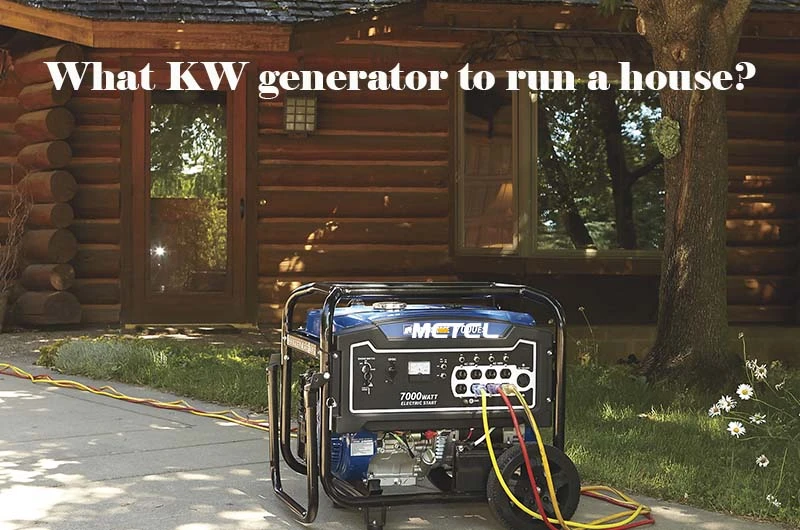The size of the generator for your house depends on factors like house size, appliances, and power outage needs. Here’s a general guideline to help you determine the kW (kilowatt) rating of the generator you might need:

What KW generator to run a house?
Contents:
- Why A Proper Generator Sizing Matters
- Calculating Whole House Electricity Consumption
- Example Calculations for Determining the Right Size Generator
- Power Just The Essentials
- Choose the Generator Size:
- Need Help Determining How to Size a Generator?
Why A Proper Generator Matters
A properly sized diesel generator keeps essential appliances and systems in the house running during power outages. This is especially important for critical equipment like refrigerators, medical devices heating/cooling systems etc.
Undersized diesel generators may struggle to meet the power demands of the house, leading to overload conditions. Overloading a diesel generator can damage appliances, electronics, and the generator itself.
A generator that matches the power requirements of the house operates more efficiently and consumes fuel more judiciously. Oversized generators may consume more fuel than necessary, leading to higher operating costs and unnecessary environmental impact.
Calculating Whole House Electricity Consumption
Home backup generators provide power to important electric appliances like freezers, AC, water supply, and emergency lights during emergencies. Different homes need different power generators to keep important systems working when there is no electricity.
- Label Stats: Volt-Amps or VA, Find Watts: Volt-Amps = Watts
- Label Stats: Volt and Amps given separately, Find Watts: Volt x Amps = Watts
- Label Stats: Kilowatts or KW, Find Watts:Kilowatts / 1000 = Watts
- Label Stats: Watts or Watt-Hours, Find Watts: Watt-Hours — Watts
Refer to the Whole House Electricity Consumption Form
Appliance | Wattage(Start/Run) |
Washing machine×1 | 1,200/1,200 |
Clothes dryer×1 | 6,570/5,400 |
2-ton central AC | 8,750/3,800 |
Electric water heater | 4.500/4,500 |
Water Pump×1 | 2,000/1,000 |
Coffee Machine×1 | 800/800 |
Electric range×1 | 2,100/2,100 |
Microwave oven×1 | 1,300/1,300 |
TVs (46")×2 | 400/400 |
Security system | 550/550 |
Hair Dryer×2 | 6,000/2,400 |
Laptop/Computer | 600/600 |
Dishwasher(cool dry) | 540/216 |
8+ light fixtures | 1,100/1,100 |
Garage door opener | 1,420/720 |
Total Wattage | 37,830/26,086 |
In this situation, To run a whole house, you’d probably want at least a 40kW whole-home generator.
Example Calculations for Determining the Right Size Generator
Example 1 (Apartment)
In example one, the person lives in a small one-bedroom home alone.
This calculation looks like this:
freezer + laptop+coffee pot + A/C+washer+electrical oven = total wattage/1,000 = total kWs
With the maximum wattage for each item on your list, the equation becomes:
2000 + 250 + 800 + 1200+1300+5,000 = 6,050/1,000 = 6.05 total kWs
In this first example, 6.05kW is the maximum requirement used to run a single apartment. An 8kW portable diesel generator is a great choice given its relatively compact size. Portable generators can meet this person’s power needs, although they may not be as powerful as home backup generators. However, they are still capable of providing sufficient power. what kw generator to run a house?
Example 1 (Whole Family House)
In the 2nd example, The family resides in a 3-bedroom house with a living room, kitchen, kennel, and garage.
This calculation looks like this:
2 ton-Air conditioning + fridge + freezer + coffee pot + electrical oven + Dishwasher + Washing Machine + Dryer + Garage opener + TVs + lamps + computers = total wattage/1,000 = total kWs
With the maximum wattage for each item on your list, the equation becomes:
8,750 + 1200 + 2000 + 800 + 1300 + 540 + 1200 + 6,570 + 1,420 + 400 + 1,100 + 800 = 26.08 total kWs
In example two, 26.08kW is the maximum requirement used to run a family house. They’ll likely want a larger generator such as a 32kW diesel generator for power outages.
Power Just The Essentials
What kw generator to run a house? Make a list of all the essential appliances and equipment you want to power during an outage. This may include lights, refrigerators, freezers, heating or cooling systems, water pumps, and other critical appliances.
Consider Starting Watts vs. Running Watts:
Make a list of all the essential appliances and equipment you want to power during an outage. This may include lights, refrigerators, freezers, heating or cooling systems, water pumps, and other critical appliances.
Determine the power consumption (in watts) of each appliance by checking its labels or using a wattage meter.
Starting load: The initial heavy load required to initiate items from a complete halt. The starting current of motors and compressors can be as much as six times the load.
Running load: The load needed to keep items operating after the initial start.
For backup use, you can calculate the load on a staggered start for multiple units to spread out the load.
Choose the Generator Size:
What kw generator to run a house? After calculating your power needs, choose a generator with a higher kW rating than your starting wattage. The generator can handle the extra power needed to start your appliances, which is 20% more than usual.
For a normal-sized house, a generator between 5 kW and 20 kW should be enough. Larger homes with more appliances may require generators with higher kW ratings.
If You’re Still Not Sure…
If you’re still not sure what kw generator to run a house, reach out to an expert. They can also help determine whether you have more power requirements than you initially thought or if you’re right on track.

